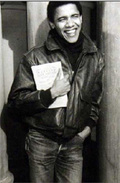Part of what affects politicians’ ability to lead is their use of personal biases and experiences to enrich leadership style and effectiveness, and create a positive public image. The current debate about the legalization of marijuana relates directly to politicians’ personal experiences with substance use. These personal experiences affect the public’s perception of the politician’s image and potentially influence the public’s perceptions of drug use. This week’s HUMANITIES uses Barack Obama’s honesty about drug use to consider the effect that politicians’ personal experiences might have on politics and the public.
Experimenting with drugs as a youth is an experience that most public figures try to keep quiet. Barack Obama is one of the few politicians who have been honest and forthcoming with information regarding his substance-related ‘skeletons in the closet’: marijuana and cocaine use. In interviews, debates, and a 1995 memoir, Dreams from my Father, Obama is candid about the personal internal struggles that he faced during his youth that led him to drug use. In Dreams from my Father, he says “I blew a few smoke rings, remembering those years. Pot had helped, and booze; maybe a little blow [cocaine] when you could afford it. Not smack [heroin], though – Mickey, my potential initiator, had been just a little too eager for me to go through with that. Said he could do it blindfolded, but he was shaking like a faulty engine when he said it…(Obama, 1995, p. 85)”

Obama’s reasoning for his honesty regarding past drug use is that he feels he owes it to younger voters to be frank about the situation. When questioned about this in the past, he responded “young people who are already in circumstances that are far more difficult than mine need to know that you can make mistakes and still recover”("Obama Admissions on Drug Use Could Signal New Era in Politics," 2007; Romano, 2007, p. A01). Obama maintains this view and told some students at a high school “You know, I made some bad decisions that I’ve actually written about. You know, got into drinking. I experimented with drugs,” he says. “There was a whole stretch of time that I didn’t really apply myself a lot. It wasn’t until I got out of high school and went to college that I started realizing, ‘Man, I wasted a lot of time’” (Saul, 2007, p. 1).
Many major news outlets (e.g., Fox, The Washington Post, The Daily News) have described Obama’s honesty as marking a new era in politics. Previously, admissions of substance-use might have been taboo for the public; the new era involves the acceptance of candidates whose life experiences might differ from the majority of voters. Further, according to Romano (2007) and articles on the Fox news website ("Obama Admissions on Drug Use Could Signal New Era in Politics," 2007), middle-aged voters who support Obama may continue to do so because, as baby boomers, they are part of a generation that spent a decade experimenting with drugs. For them, Obama’s current success proves that early substance abuse does not guarantee lifelong failure.
Despite his success, it is important to ask whether Obama’s honesty about his drug use marks a shift in public opinion about political leaders and their personal conduct. If so, the public should give potential adverse implications equal consideration. A shift towards accepting drug use and experimentation in adolescents could persuade observers to reason that addiction and substance use prevention for youth is unnecessary. However, a favorable shift in public opinion towards substance use is not reason to accept all substance use experimentation. Obama is not suggesting that adolescents can experiment with substances without worrying about short term negative consequences. Rather, he describes the circumstances surrounding his personal experimentation, while still admitting his error – turning to substance use as a solution. Far from implying leniency, this shift suggests that prevention programs and treatment for substance use and addiction are still a necessary part of youth education. Some adolescent experiments with substance use will have tragic consequences. It is for those unlucky individuals that prevention programs are continually further developed and improved.
What do you think? Comments can be addressed to Ingrid R. Maurice
References
Obama Admissions on Drug Use Could Signal New Era in Politics [Electronic (2007). Version]. FoxNews.com. Retrieved December 11, 2007.
Obama, B. (1995). Dreams From my Father: A Story of Race and Inheritance: Times Books, a division of Random House.
Romano, L. (2007). Effect of Obama’s Candor Remains to Be Seen [Electronic Version]. The Washington Post. Retrieved January 3, 2007 from http://www.washingtonpost.com/wp-dyn/content/article/2007/01/02/AR2007010201359.html.
Saul, M. (2007). Barack Obama tells N.H. kids of his alcohol, drug use during teen years [Electronic Version]. The Daily News. Retrieved November 21, 2007 from http://www.nydailynews.com/news/politics/2007/11/21/2007-11-21_barack_obama_tells_nh_kids_of_his_alcoho.html.





gindave June 18, 2008
I agree with Senator Obama on substance abuse. His prevention and treatment programs are the best
………………………
gindave